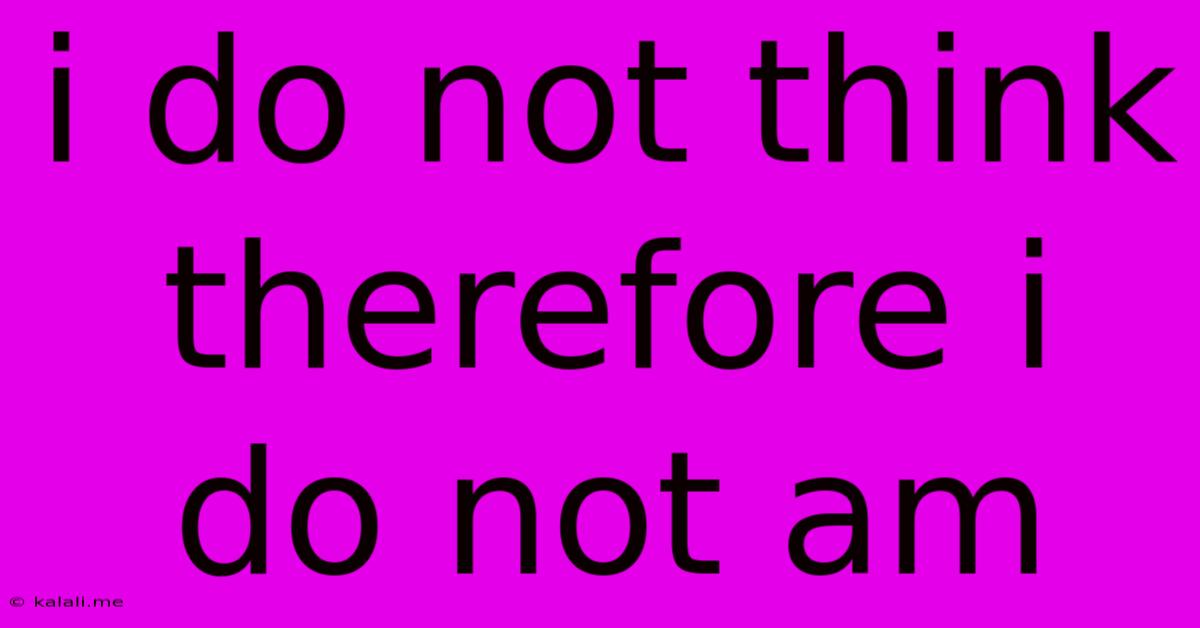I Do Not Think Therefore I Do Not Am
Kalali
Jun 03, 2025 · 3 min read

Table of Contents
I Do Not Think, Therefore I Do Not Am: A Philosophical Exploration of Descartes' Cogito and Its Negation
Descartes' famous "Cogito, ergo sum" – "I think, therefore I am" – is a cornerstone of Western philosophy. It posits that the very act of doubting one's existence proves the existence of the doubter. But what if we flip the script? What does "I do not think, therefore I do not am" imply? This seemingly simple negation opens a fascinating Pandora's Box of philosophical inquiry, challenging fundamental assumptions about consciousness, existence, and the self. This article will explore this counter-intuitive statement, examining its implications for our understanding of being.
The Cartesian Foundation: Understanding "Cogito, Ergo Sum"
Before dissecting the negation, we need to understand the original. Descartes, grappling with radical skepticism, sought an undeniable truth. He found it in the act of doubting itself. The very act of questioning one's existence proves that something must be doing the questioning – a thinking entity. This thinking entity, he concluded, is the self. This foundational statement became the bedrock for his subsequent philosophical system.
Deconstructing the Negation: "I Do Not Think, Therefore I Do Not Am"
The statement "I do not think, therefore I do not am" directly challenges Descartes' assertion. It proposes that a lack of thought implies a lack of being. This, however, presents several significant complexities:
-
Defining "Think": What constitutes "thinking"? Is it solely conscious, rational thought? Or does it encompass subconscious processes, instincts, or even basic biological functions? A narrow definition might render the statement trivially true in moments of deep sleep or unconsciousness. A broader definition, however, complicates the matter significantly. Plants, for instance, exhibit complex biological processes, but do they "think" in a way that guarantees existence?
-
The Nature of Being: What does "am" truly mean? Is it simply conscious awareness? Or does it encompass a wider spectrum of existence, encompassing physical reality and perhaps even a soul or essence? If "am" refers only to conscious awareness, then the negation holds true during periods of unconsciousness. However, a broader definition of "being" might challenge this conclusion. Does a rock "think"? No, but it undeniably exists.
-
Alternative Explanations of Existence: Descartes' cogito is predicated on a specific understanding of the self as a thinking thing. But other philosophical traditions offer alternative perspectives. Some might argue existence is independent of thought, grounded in physical reality or a divine creator. These perspectives cast doubt on the validity of the negation as a universal truth.
Implications and Interpretations
The negation of Descartes' cogito forces us to reconsider fundamental assumptions about consciousness and existence. It opens up several intriguing possibilities:
-
The Limits of the Cogito: The negation highlights the limitations of the Cartesian cogito, suggesting it may not be the universally applicable foundation for understanding existence that it is often perceived to be.
-
The Role of the Body: The negation pushes us to consider the significance of the body in our experience of being. If "thinking" is restricted to the conscious mind, and the body is excluded, then the negation might hold true only temporarily or partially.
-
Alternative Paths to Ontology: The negation encourages us to explore alternative ontological frameworks that don't rely solely on the act of thinking as the primary marker of existence.
Conclusion: A Continuous Inquiry
"I do not think, therefore I do not am" is not a simple refutation of Descartes, but rather a powerful provocation. It compels us to examine the nuances of "thinking" and "being," challenging us to consider alternative perspectives on existence and the self. It remains a potent tool for philosophical inquiry, a testament to the enduring power of questioning fundamental assumptions and relentlessly exploring the nature of reality. The debate continues, reminding us that the quest for understanding our own existence is an ongoing journey, not a destination.
Latest Posts
Latest Posts
-
How To Make Sushi Rice On The Stove
Jun 05, 2025
-
Can You Request To Be Play At A Public Place
Jun 05, 2025
-
Sharepoint How To Assign Group Permissions To Document Library
Jun 05, 2025
-
2003 Honda Accord Fuse Box Diagram
Jun 05, 2025
-
How To Keep Sheets On Your Bed
Jun 05, 2025
Related Post
Thank you for visiting our website which covers about I Do Not Think Therefore I Do Not Am . We hope the information provided has been useful to you. Feel free to contact us if you have any questions or need further assistance. See you next time and don't miss to bookmark.